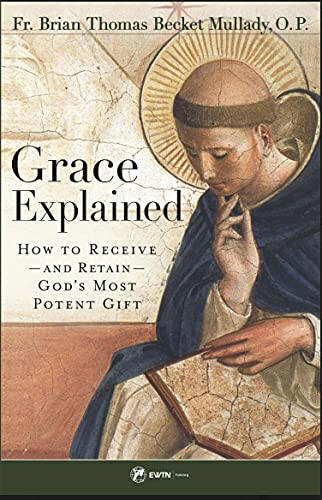Catholic Medical Quarterly Volume 72 (3) August 2022
Book Review
Grace Explained: How to receive and retain God's Most Powerful Gift.
by Fr Brian Mullady
EWTN Publishing
 This
is a wonderful, easy to read book on grace. Our moral life as Christians
depend on our life of grace, not on our own efforts. We are not Pelagians.
This
is a wonderful, easy to read book on grace. Our moral life as Christians
depend on our life of grace, not on our own efforts. We are not Pelagians.
The desire for grace resides in our intellect, says the author. Grace is not some kind of sentiment that depends on us. It is entirely a free gift of God. And we don't deserve it. But we do need to cooperate with the graces granted to us in order to retain them.
Man is called to an end he cannot attain by nature because he has a supernatural end. To reach this end, he needs grace. There is an infinite gap between us and God. Grace allows us to partici- pate in God's own life. We do not become gods: the pantheist temptation is to be found in a variety of different contemporary spiritualities.
However, grace does change us interiorly. Compare that teaching with the Protestant theory that grace merely cloaks our broken natures.
Grace can be divided into actual grace and sanc-tifying grace. Actual grace helps us to reject a life of sin and turn to God. It acts at that moment. In contrast, sanctifying grace is a habit which stays in our souls so long as we are in a state of grace. Justification is not merely turning away from sin. It includes our cultivating sanctifying grace.
The author also explores what we mean by merit. As already noted, it is God who always makes the first move, so to speak. All is grace. God is the Father who runs to greet his prodigal son. He is the Hound of Heaven. We can merit absolutely nothing on our own. We only merit because of the grace that God has granted us. But we do need to cooperate with those graces. The merit we receive as a result of allowing the Holy Spirit to act in us is condign merit. We are rewarded because we willingly accept and participate in the graces that God has granted to us. For His part, all is for the giving. As a result, the Holy Trinity abides in us by grace.
The consequence of life without grace is spelled out to us on Ash Wednesday: dust thou art and to dust thou shalt return.
This is a very good book indeed on an often complex subject.
